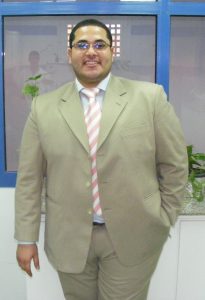Visiting Scientists & Fellows
George Taylor, Visiting Fellow
George Taylor is Director of Philanthropy Support Services at PaxTerra and currently Chair of the Advisory Council of the Center for Asian Studies and serves on the External Advisory Board of the Center for Native American and Indigenous Studies, both located at the University of Colorado in Boulder.
George is a “global nomad”. He grew up in India; spent twenty years living and working in West Africa (Nigeria, Mali, Niger), South Asia (Nepal) and South America (Bolivia); and has had short-term assignments in 35+ countries. He has worked on multiple sides of the international development equation: inside a large bilateral development assistance agency (USAID); for a private consulting firm (International Resources Group); with an international NGO managing field programs in China/Tibet, India, Afghanistan and Peru (Future Generations); with a private foundation active in international philanthropy (Winterline Foundation); and, most recently, with Philanthropy Support Services (PSS) and PaxTerra working on program and institutional evaluations for clients including the Rights & Resources Initiative, World Resources Institute, International Food Policy Research Institute/Bill & Melinda Gates Foundation, U.S. Forest Service, USAID, Bhutan Trust Fund for Environmental Conservation/World Bank, Center for People and Forests (RECOFTC), and The Nature Conservancy.
George is a graduate of Woodstock School in Uttarakhand, India and of Wesleyan University where he majored in African history. He has an MS in forest resource management and policy/ international forestry from the SUNY College of Environmental Science & Forestry.
While a visiting fellow at the Colorado Water Center, George will be continuing work started as a Visiting Fellow at SoGES exploring a) water resources management (WRM) in High Mountain Asia (aka the Third Pole), b) opportunities for CSU to more proactively engage on international water issues, and c) ways in which CSU can broaden and deepen its work on “internationalization”.
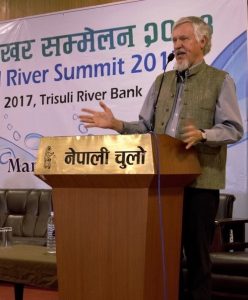
Jay Nuckols, Associate Faculty
Jay Nuckols is a CSU Emeritus Professor of Environmental Health Sciences, and Principal of JRN-Environmental Health Sciences (North Bethesda, Maryland). He continues active affiliation with CSU as an Associate Affiliate Faculty member of the Colorado Water Center, and a School of Global Environmental Sustainability designated Scholar. He has 40 years of experience in research and application of environmental sciences in ecological and human health risk assessment, including 11 years private practice where he conducted extensive studies related to water and health impacts, including one that led to a Department of Interior landmark for lands unsuitable for surface mining designation.
In 1992, Dr. Nuckols established the Environmental Health Advanced Systems Laboratory at CSU, a successful entrepreneurial platform for integration of earth, engineering, and health sciences in spatial data systems design and application to in exposure assessment and health risk analyses. Through personnel agreements between CSU and the National Institutes of Health he fostered use of the platform while serving as lead scientist on environmental epidemiological risk studies at research units in the National Cancer Institute (2002-2010) and the Fogarty International Center (2009-2011). These studies concerned exposure to fugitive emissions from agricultural pesticide use, byproducts of water disinfection, combusted fuel emissions, as well as metal, chemical, and biological contamination in public and private water supplies, waterways, and aquifers.
Dr. Nuckols earned PhD, MS, and BS degrees in engineering from the University of Kentucky (1982), Northwestern University (1975), and Texas A&I University (1973), respectively. Specializations of his training and practice include contaminant fate/transport modeling, surface and groundwater hydrology, and environmental health assessment and protective design. Current research interests include interpretation of “big data” (e.g. climate change models) for utility in local and regional health impact assessment and prevention, and adoption of a standard protocol for exposure assessment in environmental epidemiological health risk assessment.
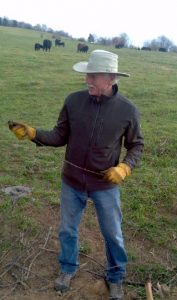
John Mathews, Senior Water Fellow
John H. Matthews is the Coordinator and co-founder of the Alliance for Global Water Adaptation (AGWA), which is hosted by the World Bank and the Stockholm International Water Institute (SIWI). His work blends technical and policy knowledge for climate adaptation and water management for practical implementation. John has worked on five continents and more than two dozen countries and published in many policy, scientific and technical journals and books, including Science and Nature Climate Change. His work primarily targets decision-making frameworks for adapting water infrastructure and ecosystems to climate impacts.
He co-founded the #ClimateIsWater advocacy group, now led by the World Water Council, and has been asked by the UNFCCC to lead several water initiatives, including the first global water-climate dialogue at a COP. Recent projects have included leading teams of more than 100 experts to develop green and climate bond resilience criteria for water investments (which has funded more than 1 billion USD in their first year), co-authoring a state-of-the-art guidance for mainstreaming climate adaptation into water management applied on four continents to date, developing climate-sensitive approaches to environmental allocations such as environmental flows at national and project levels, working with global policy instruments and institutions to embed water-climate knowledge into climate mitigation and adaptation initiatives, coordinating efforts to use finance mechanisms to implement nature-based solutions to climate adaptation, assembling curricula to build capacity around sustainable resource management, and exploring new economic tools to support integrated long-term planning.
John has advised a wide range of institutions, including bilateral, multilateral, NGO, national level agencies, UN agencies, foundations, and corporations on topics ranging from non-stationary resource management, finance, economics, and management practice. He is a columnist with OoskaNews, a Senior Water Fellow at Colorado State University, a Courtesy Faculty member of the Water Resources Graduate Program at Oregon State University, and Senior Fellow with the Oak Ridge National Laboratory. Previously, John started and directed global freshwater climate adaptation programs for WWF and Conservation International. He has PhD in ecology from the University of Texas, where he studied long-distance migration by dragonflies.

Farhet Shaheen, Visiting Scientist
In January 2017, the Center welcomed Farhet Shaheen from India. Dr. Shaheen is an agricultural economist from Kashmir, India, where he serves as faculty at Sher-e-Kashmir University of Agricultural Sciences and Technology and is a visiting scientist at the University of Connecticut. His research focuses on the Himalayas hydro-economic modeling for transboundary river basin management in the Indus basin. As a visiting scientist at CSU, Shaheen met with faculty from the Colleges of Engineering, Agricultural Sciences, and Liberal Arts. He hosted a special seminar, High Altitude Water Conservation Technologies in Cold Arid Desert of Northwestern Himalaya in Wake of Climate Change, in which he explored how restoring and developing the art of glacier grafting may be used to address water problems in the region.
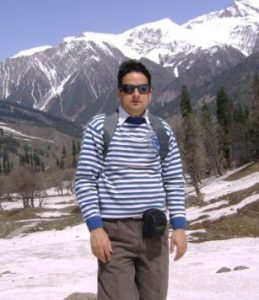
Inas Hossien, Visiting Scientist
In November 2015, the Center welcomed Dr. Inas El-Gafy from Egypt. Dr. El-Gafy is a professor in the Strategic Research Unit at the National Water Research Center in Cairo, Egypt. Dr. El-Gafy’s work experience is in the field of integrated water resources and environmental planning and management. Dr. El-Gafy has been involved in numerous national and regional projects in the area of decision support systems for water resources and environment management, strategic plans for food security, the evaluation and assessment of the water users associations in Egypt through different perspectives and various scientific approaches, the evaluation and assessment of the water quality of surface and groundwater, optimizing the use of water resources in agriculture towards increasing land and water productivity, climatic change and its effect on water resources, and mainstreaming gender dissemination into integrated water resources management. Dr. El-Gafy has more than 30 research papers published in national and international journal and conferences.
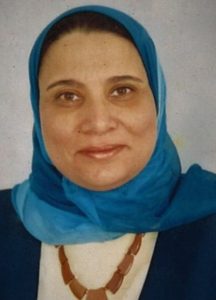
Kareem Ahmad, Visiting Scientist
In April 2014, the Center welcomed Kareem Ahmad from Egypt. While at CSU, Mr. Ahmad worked with Lou Swanson in the Office of Engagement and Pete Taylor in the Department of Sociology. Mr. Ahmad is an Assistant Researcher and Lecturer at the Desert Research Center in Cairo, Egypt, which is an academic center of the Ministry of Agriculture. Mr. Ahmad has a Masters degree in Rural Sociology and is a PhD candidate at the University of Alexandria, Egypt in the Faculty of Agriculture, Rural Development Department. He is research interests include water resources, particularly agricultural water associations and agricultural irrigation allocation and management.
